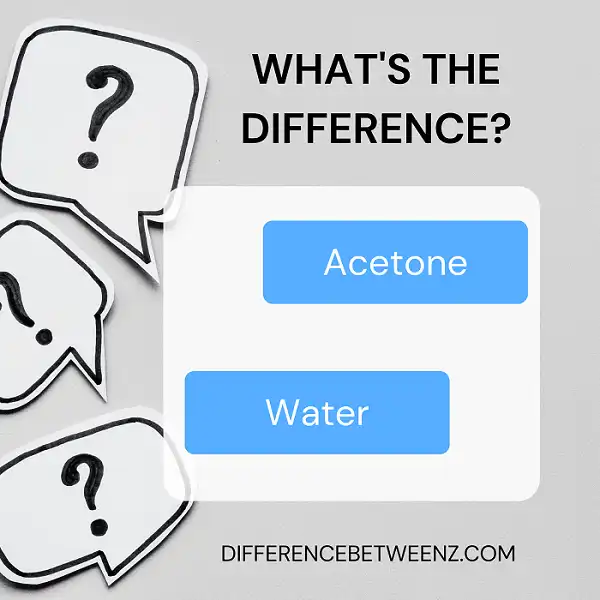As the two most commonly used solvents, acetone and water have innumerable applications in our everyday lives. But do you really know what makes them different from each other? In this blog post, we’re going to dive into the chemistry of both solvents to give you an in-depth look at the difference between acetone and water. Find out for yourself which one is better for cleaning surfaces and why it’s so important to understand their unique differences!
What is Acetone?
- Acetone, also known as propanone or dimethyl ketone (C3H6O), is a clear, colorless liquid with a distinctive sweet smell. It is found naturally in many plants and animals and is used in a variety of products ranging from cosmetics to medicine.
- Acetone has a boiling point of 56 °C and evaporates rapidly, making it highly flammable and explosive. Acetone is used industrially in the production of plastics, drugs, and medicines, solvents for cleaning or thinning out paint and lacquers, paints and coatings removers, defrosting automobile windshields, textile dyeing agents, etc.
- Acetone can be purchased at most hardware stores as an inexpensive way to clean up after woodworking projects or other types of home repair since it can easily dissolve oily adhesives. Acetone has been proven to be useful in green chemistry practices due to its low toxicity level. Acetone is an important chemical for both commercial and DIY purposes.
What is Water?
Water, or H2O, is a compound made of two hydrogen atoms and one oxygen atom bound together. Water comprises approximately 70 percent of the surface of the Earth and is essential for life on the planet. It supports all known forms of life, regulates temperature, and cycles up and down through land, oceans, and the atmosphere to distribute resources.
Water has been called the universal solvent: it can dissolve more substances than any other liquid. The presence of water makes a huge difference in creating a habitable environment. Water is vital not only to our body’s systems but also to that of every living organism on Earth.
Difference between Acetone and Water
Acetone and water are two substances that may look and feel similar but have several notable differences.
- Acetone is a colorless, volatile liquid that has an odor of nail polish remover and is classified as a ketone.
- On the other hand, water is a clear liquid composed of two parts hydrogen and one part oxygen.
- Acetone has a boiling point of 56.5°C while water’s boiling point is 100°C – making it approximately 43.5°C hotter than Acetone.
- Acetone also evaporates at a much faster rate than water, since its low surface tension allows it to quickly spread over surfaces due to its polar nature.
- Acetone also has a higher solubility in common household products such as paints and lacquers compared to water.
Both Acetone and Water are useful in many regards, however, understanding the differences between them can help people make more informed decisions about which one to use for specific tasks for maximum efficiency.
Conclusion
Many people think that acetone and water are the same things, but they are actually quite different. Acetone is a solvent, which means it can dissolve other substances. Water, on the other hand, is a liquid made up of hydrogen and oxygen. Acetone is also flammable, while water is not. So, next time you’re looking for a cleaning solution, make sure you use the right one for the job!


